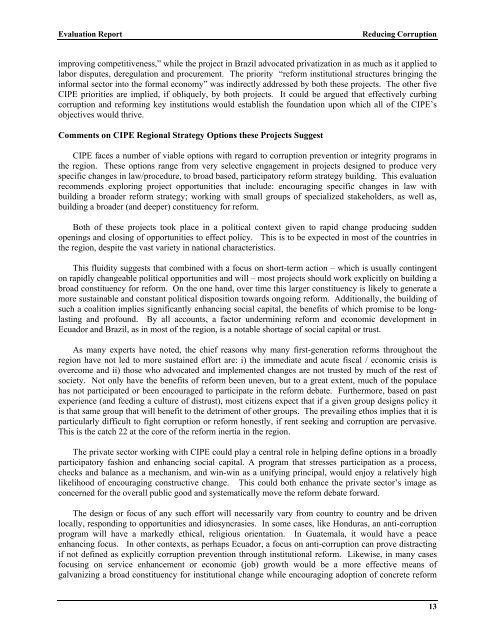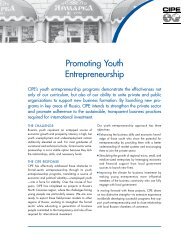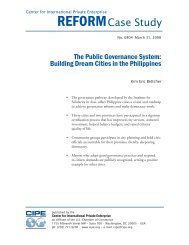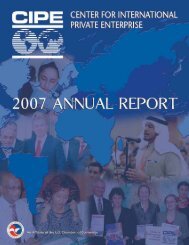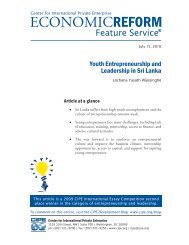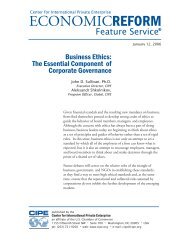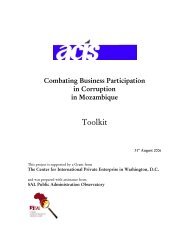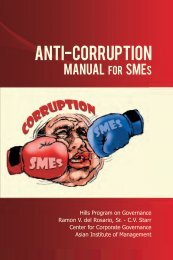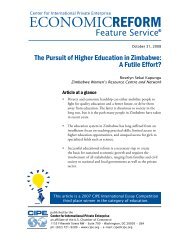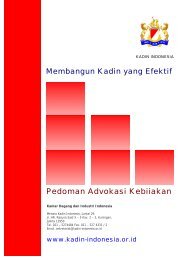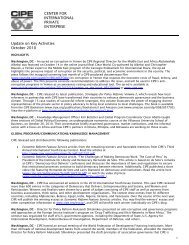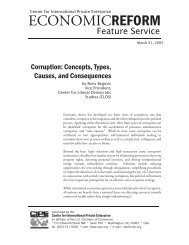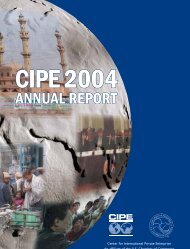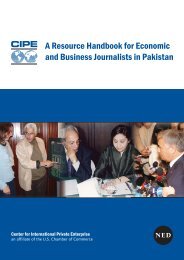REDUCING CORRUPTION A Report on Two Anti-Corruption Projects
REDUCING CORRUPTION A Report on Two Anti-Corruption Projects
REDUCING CORRUPTION A Report on Two Anti-Corruption Projects
You also want an ePaper? Increase the reach of your titles
YUMPU automatically turns print PDFs into web optimized ePapers that Google loves.
Evaluati<strong>on</strong> <str<strong>on</strong>g>Report</str<strong>on</strong>g>Reducing Corrupti<strong>on</strong>improving competitiveness,” while the project in Brazil advocated privatizati<strong>on</strong> in as much as it applied tolabor disputes, deregulati<strong>on</strong> and procurement. The priority “reform instituti<strong>on</strong>al structures bringing theinformal sector into the formal ec<strong>on</strong>omy” was indirectly addressed by both these projects. The other fiveCIPE priorities are implied, if obliquely, by both projects. It could be argued that effectively curbingcorrupti<strong>on</strong> and reforming key instituti<strong>on</strong>s would establish the foundati<strong>on</strong> up<strong>on</strong> which all of the CIPE’sobjectives would thrive.Comments <strong>on</strong> CIPE Regi<strong>on</strong>al Strategy Opti<strong>on</strong>s these <strong>Projects</strong> SuggestCIPE faces a number of viable opti<strong>on</strong>s with regard to corrupti<strong>on</strong> preventi<strong>on</strong> or integrity programs inthe regi<strong>on</strong>. These opti<strong>on</strong>s range from very selective engagement in projects designed to produce veryspecific changes in law/procedure, to broad based, participatory reform strategy building. This evaluati<strong>on</strong>recommends exploring project opportunities that include: encouraging specific changes in law withbuilding a broader reform strategy; working with small groups of specialized stakeholders, as well as,building a broader (and deeper) c<strong>on</strong>stituency for reform.Both of these projects took place in a political c<strong>on</strong>text given to rapid change producing suddenopenings and closing of opportunities to effect policy. This is to be expected in most of the countries inthe regi<strong>on</strong>, despite the vast variety in nati<strong>on</strong>al characteristics.This fluidity suggests that combined with a focus <strong>on</strong> short-term acti<strong>on</strong> – which is usually c<strong>on</strong>tingent<strong>on</strong> rapidly changeable political opportunities and will – most projects should work explicitly <strong>on</strong> building abroad c<strong>on</strong>stituency for reform. On the <strong>on</strong>e hand, over time this larger c<strong>on</strong>stituency is likely to generate amore sustainable and c<strong>on</strong>stant political dispositi<strong>on</strong> towards <strong>on</strong>going reform. Additi<strong>on</strong>ally, the building ofsuch a coaliti<strong>on</strong> implies significantly enhancing social capital, the benefits of which promise to be l<strong>on</strong>glastingand profound. By all accounts, a factor undermining reform and ec<strong>on</strong>omic development inEcuador and Brazil, as in most of the regi<strong>on</strong>, is a notable shortage of social capital or trust.As many experts have noted, the chief reas<strong>on</strong>s why many first-generati<strong>on</strong> reforms throughout theregi<strong>on</strong> have not led to more sustained effort are: i) the immediate and acute fiscal / ec<strong>on</strong>omic crisis isovercome and ii) those who advocated and implemented changes are not trusted by much of the rest ofsociety. Not <strong>on</strong>ly have the benefits of reform been uneven, but to a great extent, much of the populacehas not participated or been encouraged to participate in the reform debate. Furthermore, based <strong>on</strong> pastexperience (and feeding a culture of distrust), most citizens expect that if a given group designs policy itis that same group that will benefit to the detriment of other groups. The prevailing ethos implies that it isparticularly difficult to fight corrupti<strong>on</strong> or reform h<strong>on</strong>estly, if rent seeking and corrupti<strong>on</strong> are pervasive.This is the catch 22 at the core of the reform inertia in the regi<strong>on</strong>.The private sector working with CIPE could play a central role in helping define opti<strong>on</strong>s in a broadlyparticipatory fashi<strong>on</strong> and enhancing social capital. A program that stresses participati<strong>on</strong> as a process,checks and balance as a mechanism, and win-win as a unifying principal, would enjoy a relatively highlikelihood of encouraging c<strong>on</strong>structive change. This could both enhance the private sector’s image asc<strong>on</strong>cerned for the overall public good and systematically move the reform debate forward.The design or focus of any such effort will necessarily vary from country to country and be drivenlocally, resp<strong>on</strong>ding to opportunities and idiosyncrasies. In some cases, like H<strong>on</strong>duras, an anti-corrupti<strong>on</strong>program will have a markedly ethical, religious orientati<strong>on</strong>. In Guatemala, it would have a peaceenhancing focus. In other c<strong>on</strong>texts, as perhaps Ecuador, a focus <strong>on</strong> anti-corrupti<strong>on</strong> can prove distractingif not defined as explicitly corrupti<strong>on</strong> preventi<strong>on</strong> through instituti<strong>on</strong>al reform. Likewise, in many casesfocusing <strong>on</strong> service enhancement or ec<strong>on</strong>omic (job) growth would be a more effective means ofgalvanizing a broad c<strong>on</strong>stituency for instituti<strong>on</strong>al change while encouraging adopti<strong>on</strong> of c<strong>on</strong>crete reform13


